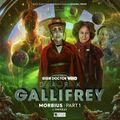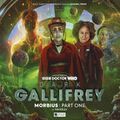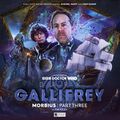Morbius (audio story)
- You may be looking for the titular renegade Time Lord or the Gallifreyan Vampire of the same name.
Morbius was the first story in three parts of the Dark Gallifrey audio series, released in 2024, in celebration of the 25th anniversary of Big Finish Productions creating Doctor Who audio spin-offs.
Part One was released on 3 April, Part Two was released on 2 May and Part Three was released on 20 June.
Publisher's summary
Part One
When things turn dark, and you're all alone, there is one traveller of time and space... a wanderer in the fourth dimension... a renegade Time Lord... who will always be there to bring back the light.
But the thing about Time Lords... is they can't all be heroes.
The time has come for the last Time Lord battleship, the Proteus, to leave the planet Karn and return to Gallifrey victorious. But her voyage home will not be easy. The Captain is sick, the crew is restless, and there are dark forces lurking in the hold below...
Part Two
When disaster strikes the Proteus, Captain Argento and her crew must fight for their lives and the fate of all Time Lords.
What is out there on the ice? Who hides in the impossible temple?
As loyalties shift and secrets emerge, the cult of Morbius lies in wait to bring about the General's return...
Part Three
Morbius has been brought back to life on the Isle of the Dead. But a desperate Captain Argento has called for help and received an unlikely ally. Here is a stranger who knows the tyrant of old and is the only one who can put his plans on ice. But perhaps even the Doctor cannot stop the threat of Dark Gallifrey...
Plot
Part One
to be added
Part Two
to be added
Part Three
to be added
Cast
- Morbius / Interface / Morbius Beast - Samuel West
- The Doctor - Tom Baker
- Rolko - Mina Anwar
- Captain Argento - Rachel Atkins
- The Shimmering Man - Justin Avoth
- The Eleven - Mark Bonnar
- Veritas - Andrew French
- Narrata - Janet Henfrey
- Gilda - Lara Lemon
- Mr Middlewitch - Hywel Morgan
Crew
- Script Editor - John Dorney
- Writer - Tim Foley
- Theme Music - Rob Harvey
- Senior Producer - John Ainsworth
- Range Producer - Robert Valentine
- Cover Art - Caroline Tankersley
- Director - Samuel Clemens
- Executive Producer - Jason Haigh-Ellery, Nicholas Briggs
- Music - Howard Carter
- Producer - David Richardson
- Sound Design - Howard Carter
Worldbuilding
- Morbius's revolution was the Time Lords’ first civil war. During the conflict, the Time Lords used their powers over time for bloodshed.
- A new High Council is in place following the defeat of Morbius.
- The Civil War caused significant damage to the Time Vortex.
- The crew of the Proteus were rebels and outsiders who were conscripted for the war with promises of restoration of their Time Lord abilities. Only the captain has received hers, being enabled to regenerate.
- Gilda claims it can take centuries to fill a vial with the elixir.
- Veritas is a Hydran. Their planet were destroyed by the Time Lords, who dropped their own future on their planet, causing anarchy.
- Veritas carries the minds of the dead in his mind. He was overwhelmed by his people's memories following their planet's destruction until Morbius healed him.
- There is a state of grace inside the Temple of Morbius.
- Argento was once in Rassilon’s presence.
- Events of the Civil War depicted in the Temple's shifting murals include the Siege of Skaro, the Declaration of Hate and the return of the Vampires. Argento recalls the vampires were on their own side.
- Karn is a fixed point in time according to the hologram of Morbius.
- The Time Lord known by some as "the Collective" is the son of Argento’s son. The hologram claims that his issues with regeneration run in the family.
- The Doctor speculates the Matrix is more of a secret in Argento’s period of Time Lord history.
- The Doctor diagnoses Argento as having regenerative disassociation, where mind and body no longer match after a regeneration. The Sisterhood’s elixir can alleviate its effects.
- The Temple of Morbius is a time rotor to open gateways.
- Morbius plans to rally his forces at Dark Gallifrey.
- Morbius claims the Temple and directions for where to rally was sent to him by his own future self.
Notes
- The cover for the first part of the story originally rendered the subtitle as Part 1.[1] This was later changed to Part One, creating uniformity with the other two covers which read Part Two and Part Three respectively.
- To promote the release of this story, Big Finish notably used the phrase "It's Morbin' time!"[2], a meme based on the 2022 film Morbius, based on the unrelated Marvel Comics character of the same name, which also starred Matt Smith.[3]
Continuity
- The Great Schism is said to involve the President succeeding Rassilon, as was the case in PROSE: The Legacy of Gallifrey [+]Loading...["The Legacy of Gallifrey (short story)"].
- The name of this President is said to be lost to the records and changes with every telling, referencing that PROSE: The Legacy of Gallifrey [+]Loading...["The Legacy of Gallifrey (short story)"] and PROSE: Warmonger [+]Loading...["Warmonger (novel)"] give different names for the President facing Morbius.
- An individual's first regeneration is said to give them a second heart, something established in the novels The Man in the Velvet Mask [+]Loading...["The Man in the Velvet Mask (novel)"] and Christmas on a Rational Planet [+]Loading...["Christmas on a Rational Planet (novel)"].
- Morbius is called "the General", a title from PROSE: Warmonger [+]Loading...["Warmonger (novel)"].
- One of the Temple's murals is Morbius Exiled, depicting Morbius being exiled from Gallifrey due to his declarations that all Gallifreyans were equal, something established in PROSE: The Legacy of Gallifrey [+]Loading...["The Legacy of Gallifrey (short story)"].
- Regeneration is mentioned to originate from the Eye of Harmony, as was the case in PROSE: The Legacy of Gallifrey [+]Loading...["The Legacy of Gallifrey (short story)"].
- Argento initially assumes that sounding the Horn of Rassilon, in bringing forth "the First Time Lord", would summon Rassilon; Rassilon is referred to as the First of the Time Lords in PROSE: The Legacy of Gallifrey [+]Loading...["The Legacy of Gallifrey (short story)"]. However, the Horn actually summons a projection of a later President of the High Council, in this case the Fourth Doctor. The title of "First Time Lord", used as a credit for two Time Lord leaders in TV: The War Games [+]Loading...["The War Games (TV story)"] and TV: Colony in Space [+]Loading...["Colony in Space (TV story)"], was established in PROSE: Doctor Who and the Doomsday Weapon [+]Loading...["Doctor Who and the Doomsday Weapon (novelisation)"] to refer to the most "superior Time Lord" in the Gallifreyan hierarchy.
- Argento refers to a Pazithi bat, a Gallifreyan creature first mentioned by Irving Braxiatel in AUDIO: Soldier Obscura [+]Loading...["Soldier Obscura (audio story)"].
- Argento speaks disdainfully of the Sisterhood of Karn's "Pythian philosophy", alluding to the idea devised in PROSE: Gallifrey - Notes on the Planet's Background [+]Loading...["Gallifrey - Notes on the Planet's Background (short story)"] and established in PROSE: Cat's Cradle: Time's Crucible [+]Loading...["Cat's Cradle: Time's Crucible (novel)"] that the Sisterhood of Karn are a splinter of Gallifreyan society, founded by the Pythia's followers after they were exiled from the planet by the new order of Time Lords.
- The Matrix projection of the Doctor recalls he’s a president of Gallifrey, as depicted in TV: The Invasion of Time [+]Loading...["The Invasion of Time (TV story)"].
- The Doctor recalls his previous encounter with Morbius's brain, with Morbius realising this means Solon’s plan worked. This encounter and Solon appeared in TV: The Brain of Morbius [+]Loading...["The Brain of Morbius (TV story)"].
- The Doctor compares Morbius's mind duel to him facing the dark aides of Omega’s mind, as depicted in TV: The Three Doctors [+]Loading...["The Three Doctors (TV story)"].
Gallery
Illustration by Jamie Lenman for DWM 605.
External links
- Official Morbius: Part One page at bigfinish.com
- Official Morbius: Part Two page at bigfinish.com
- Official Morbius: Part Three page at bigfinish.com








